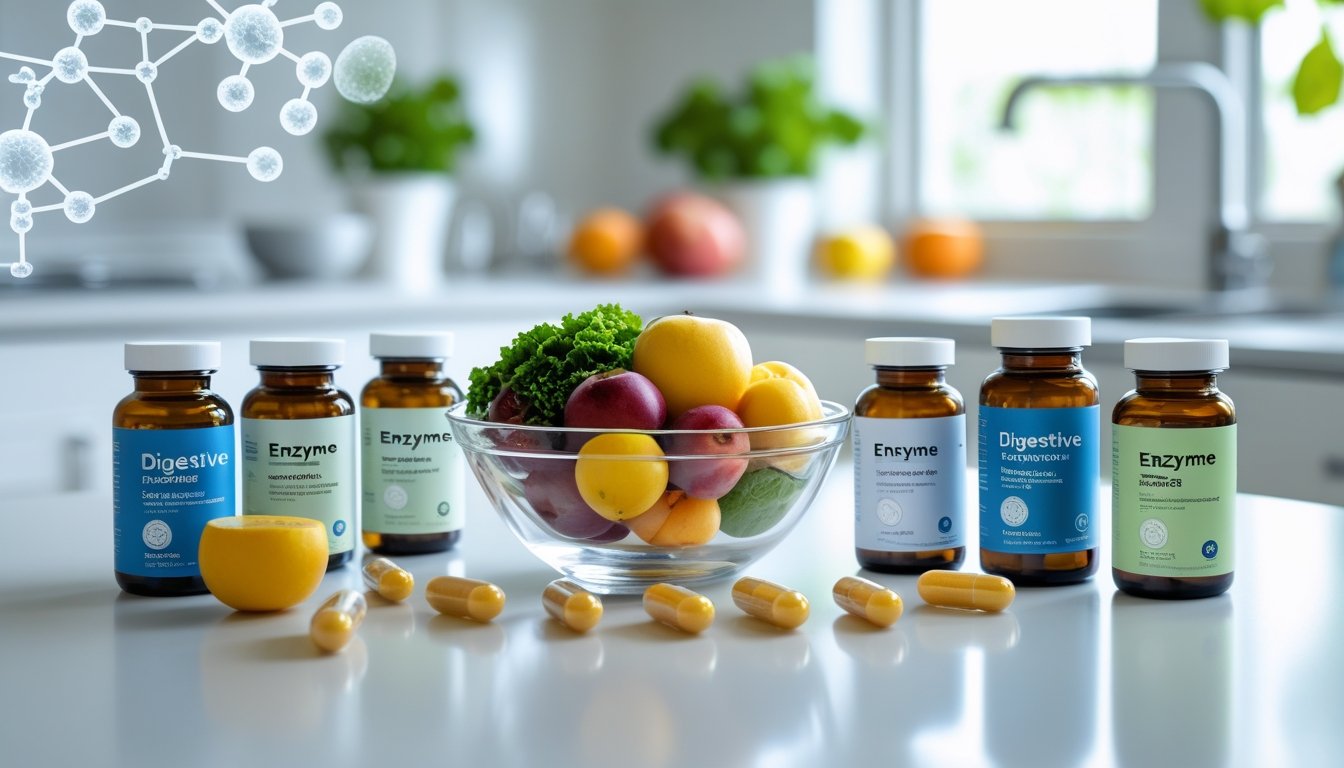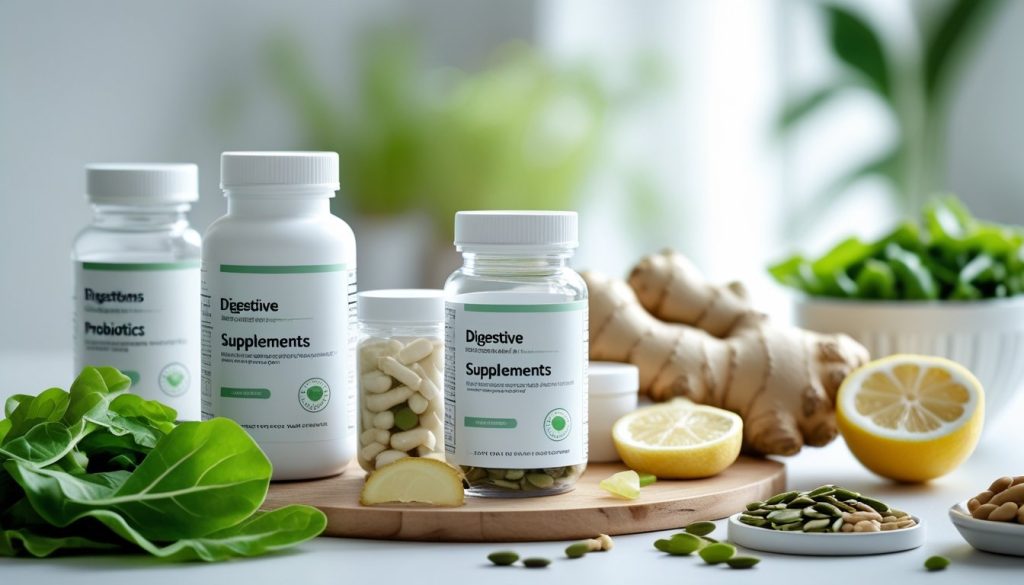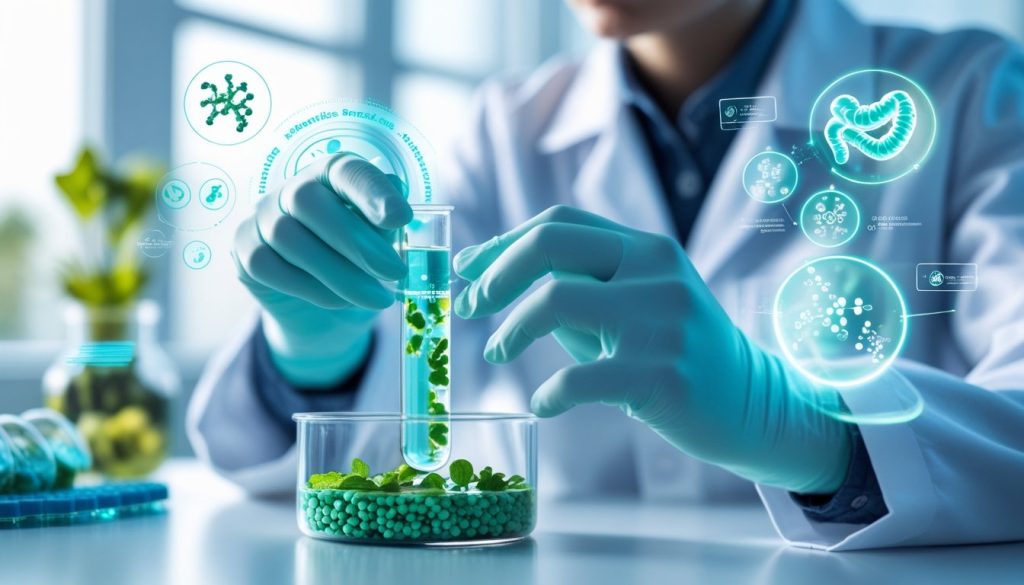Your digestive system works tirelessly to break down food and extract vital nutrients, but sometimes it needs extra support1. Digestive enzymes are specialized proteins that accelerate the breakdown of food into smaller, absorbable components, making them essential for optimal gut health and overall wellness12. Whether you're dealing with occasional bloating, digestive discomfort, or simply want to optimize your nutrient absorption, understanding these six crucial digestive enzymes can transform your digestive health.
Understanding Digestive Enzymes and Their Importance
Your body naturally produces digestive enzymes in various organs, including the pancreas, small intestine, and salivary glands13. These biological catalysts target specific nutrients: proteases break down proteins, lipases handle fats, and amylases process carbohydrates14. However, factors like aging, chronic stress, certain medications, and health conditions can reduce enzyme production, leading to digestive distress56.
Signs you might benefit from digestive enzyme support include persistent bloating after meals, excessive gas, undigested food in stool, feeling uncomfortably full after eating normal portions, heartburn, and indigestion5. More serious indicators might include nutrient deficiencies despite a balanced diet or unexplained digestive symptoms45.
The 6 Essential Digestive Enzymes You Need
1. Amylase: The Carbohydrate Specialist
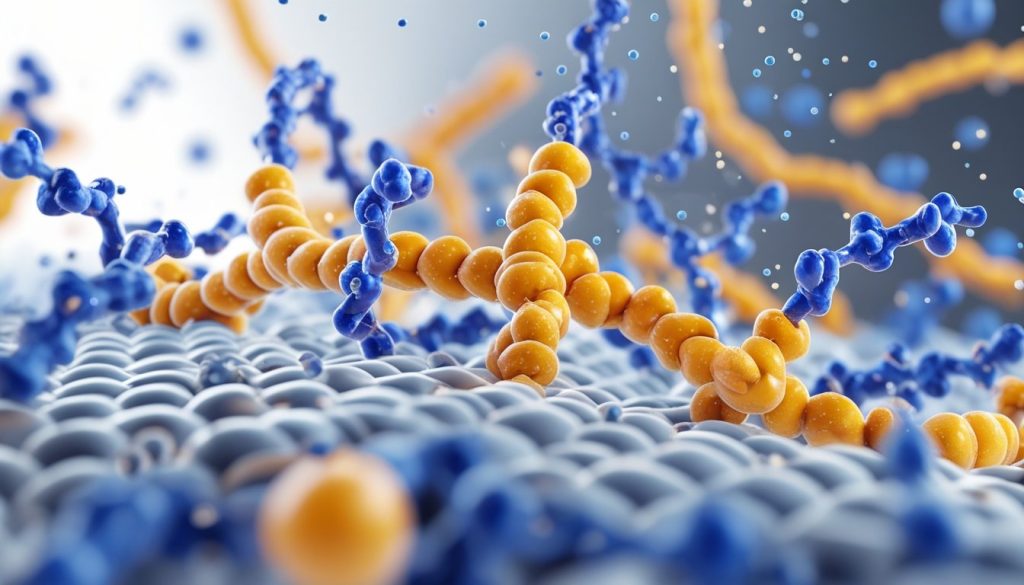
Amylase is your body's primary enzyme for breaking down complex carbohydrates and starches into simpler sugars15. Produced mainly by the pancreas and salivary glands, amylase begins working the moment food enters your mouth78. This enzyme is particularly important if you consume a diet rich in grains, potatoes, and other starchy foods58.
Key Benefits of Amylase:
- Improved Energy Levels: When you properly absorb carbohydrates, your body operates at peak energy production efficiency, reducing hunger pangs and fatigue9
- Better Digestion: Prevents undigested carbohydrates from fermenting in your gut, which can cause gas, bloating, and discomfort58
- Blood Sugar Support: Research shows that adequate amylase levels help maintain normal blood sugar levels and may support diabetes management7
- Stress Management: Studies have found connections between low salivary amylase levels and higher stress hormones in the body9
2. Protease: The Protein Powerhouse
Protease enzymes break down proteins into amino acids, the building blocks your body needs for muscle repair, immune function, and countless other processes15. Different types of proteases work at various pH levels throughout your digestive tract, ensuring proteins are thoroughly digested510.
Key Benefits of Protease:
- Enhanced Protein Utilization: Improves the breakdown and absorption of dietary proteins from both animal and plant sources11
- Reduced Inflammation: Protease helps break down inflammatory proteins and may reduce symptoms related to inflammatory conditions411
- Immune System Support: By digesting unwanted proteins and cellular debris, proteases help reduce the burden on your immune system10
- Athletic Recovery: Studies suggest protease supplementation may reduce muscle soreness and speed recovery after intense physical activity411
3. Lipase: The Fat Processor
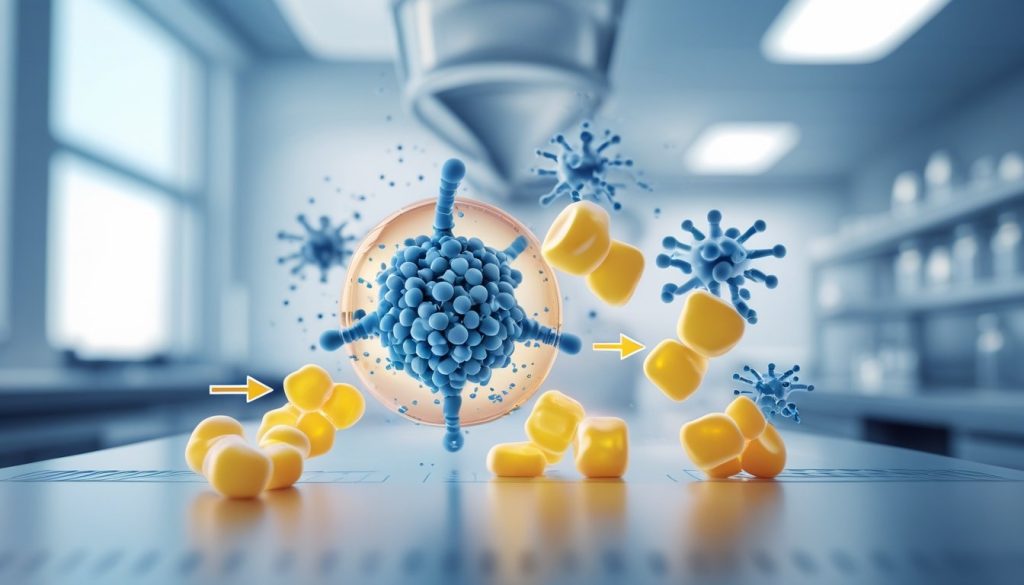
Lipase enzymes are responsible for breaking down dietary fats into fatty acids and glycerol, making them absorbable and usable by the body15. Primarily produced by the pancreas, lipase is essential for digesting all fat-containing foods512.
Key Benefits of Lipase:
- IBS Relief: Supplements containing lipase can help reduce bloating, gas, and fullness following meals, especially those high in fat12
- Cardiovascular Health: Adequate lipase levels help maintain healthy cholesterol and triglyceride levels, supporting heart health12
- Weight Management: Research shows lipase could be complementary to weight loss efforts by improving fat digestion efficiency12
- Nutrient Absorption: Essential for absorbing fat-soluble vitamins and preventing deficiencies12
4. Lactase: The Dairy Digestor
Lactase breaks down lactose, the sugar found in milk and dairy products, into glucose and galactose113. While lactase production naturally decreases with age in many people, supplementation can help those with lactose intolerance enjoy dairy products without discomfort1314.
Key Benefits of Lactase:
- Lactose Intolerance Management: Clinical studies show lactase supplements effectively reduce gastrointestinal symptoms in lactose-intolerant individuals1415
- Reduced Digestive Distress: Prevents symptoms like bloating, gas, diarrhea, and abdominal pain associated with lactose consumption1316
- IBS Support: May help individuals with IBS who experience symptoms triggered by dairy consumption15
- Expanded Food Choices: Allows lactose-intolerant individuals to enjoy a wider variety of nutritious dairy foods1416
5. Bromelain: The Pineapple Protease
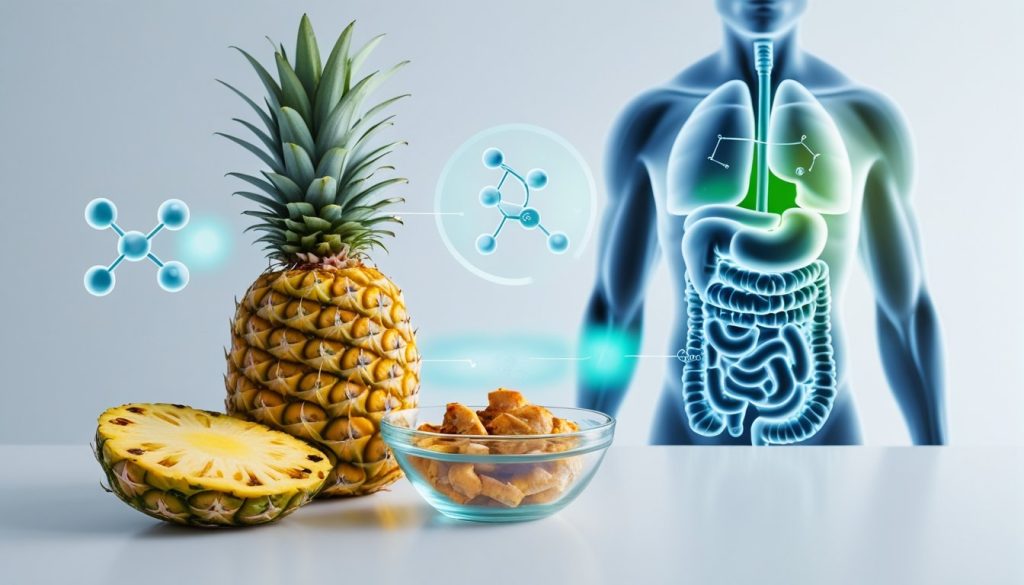
Bromelain is a protein-digesting enzyme naturally found in pineapple fruit and juice1718. This enzyme has been used for centuries to support digestive health and offers unique benefits beyond basic protein digestion17.
Key Benefits of Bromelain:
- Superior Protein Digestion: Ensures proteins are properly broken down and amino acids are absorbed efficiently1718
- Anti-Inflammatory Properties: Studies show bromelain can reduce inflammation, joint stiffness, and pain in conditions like osteoarthritis1118
- Gut Health Support: Promotes gut lining integrity and reduces oxidative stress that can interfere with digestive function17
- Respiratory Health: The antioxidant properties help reduce inflammation in the respiratory tract17
6. Alpha-Galactosidase: The Bean Bloat Buster
Alpha-galactosidase breaks down complex carbohydrates found in beans, legumes, and certain vegetables that the human body cannot naturally digest119. This enzyme is particularly valuable for people who want to include more plant-based foods in their diet1920.
Key Benefits of Alpha-Galactosidase:
- Gas and Bloating Reduction: Clinical studies show significant reduction in gas and abdominal discomfort after consuming beans and legumes1920
- Improved Plant Food Tolerance: Makes nutritious foods like beans, lentils, and cruciferous vegetables more digestible19
- Enhanced Nutrient Absorption: By reducing digestive discomfort, it allows for better absorption of nutrients from plant foods19
- IBS Symptom Relief: May help IBS sufferers who are sensitive to fermentable carbohydrates (FODMAPs)19
How to Choose and Use Digestive Enzymes
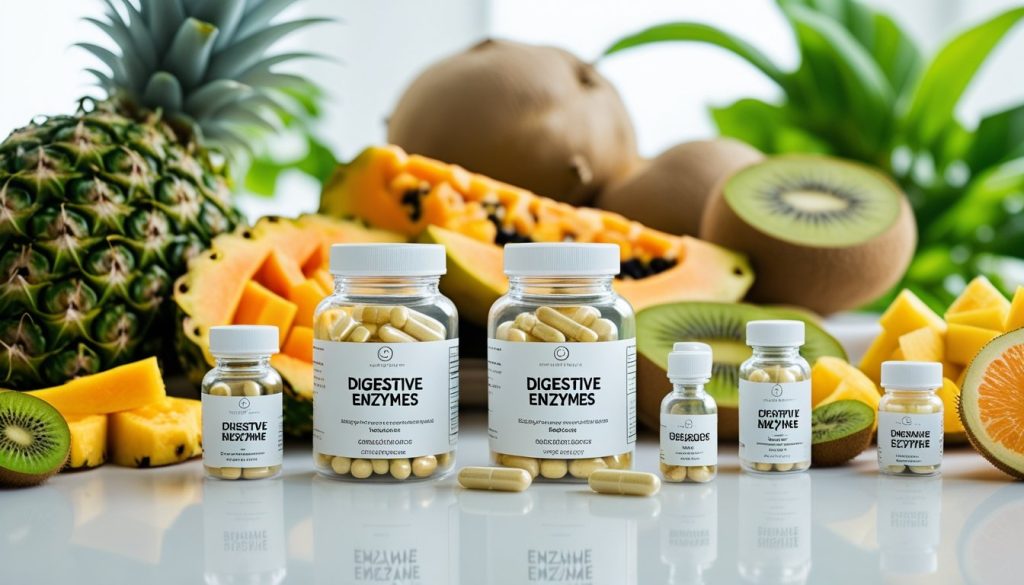
When selecting digestive enzyme supplements, consider factors such as the types of enzymes included, dosage, and product quality21. Some supplements contain only one type of enzyme, while others offer comprehensive blends to aid digestion of different food types2122. Plant and microbe-derived enzymes are considered most stable and effective, remaining active over a wide pH range throughout the digestive tract22.
Best Practices for Enzyme Supplementation:
- Take enzymes with meals for optimal effectiveness114
- Start with lower doses and gradually increase as needed14
- Choose high-quality supplements from reputable manufacturers21
- Consult healthcare providers before starting any new supplement regimen34
The Science Behind Digestive Enzyme Benefits
Research consistently demonstrates the effectiveness of digestive enzyme supplementation for various digestive concerns24. Studies show these enzymes can reduce symptoms of irritable bowel syndrome, increase nutrient absorption, and improve overall digestive comfort24. The digestive enzyme supplement market is experiencing strong growth, with predictions of 6.9% compound annual growth rate through 2025, driven by increasing awareness of digestive health and rising prevalence of gastrointestinal complications6.
Frequently Asked Questions
1. Who should consider taking digestive enzyme supplements?
People experiencing persistent bloating, gas, indigestion, or those with diagnosed enzyme deficiencies may benefit from supplementation14.
2. Are digestive enzymes safe for daily use?
Most digestive enzymes are generally safe when used as directed, though it's best to consult with a healthcare provider13.
3. Can I get digestive enzymes from food sources?
Yes, foods like pineapple (bromelain), papaya (papain), and fermented foods contain natural enzymes2217.
4. How long does it take to see results from enzyme supplements?
Many people notice improvements in digestive comfort within days to weeks of consistent use1114.
5. Do digestive enzymes help with weight loss?
While not primarily weight loss supplements, improved digestion and nutrient absorption may support healthy weight management12.
6. Can children take digestive enzyme supplements?
Dosages should be adjusted according to manufacturer instructions and the child's age, with healthcare provider guidance14.
7. Are there any side effects to digestive enzymes?
Side effects are generally rare but may include mild digestive upset in some individuals34.
8. Should I take enzymes with every meal?
This depends on your individual needs and the type of enzyme; some are taken with specific foods while others with all meals1314.
9. Do digestive enzymes interact with medications?
Some enzymes may interact with certain medications, so consult your healthcare provider if you take prescription drugs3.
10. How do I know if digestive enzymes are working?
Improvements in bloating, gas, indigestion, and overall digestive comfort indicate the enzymes are effective45.
Conclusion: Optimizing Your Digestive Health
Digestive enzymes represent a powerful tool for optimizing gut health and overall wellness12. These six essential enzymes—amylase, protease, lipase, lactase, bromelain, and alpha-galactosidase—each play unique roles in breaking down different food components and supporting digestive comfort15. While healthy individuals may not need additional enzyme supplementation, those experiencing digestive discomfort or specific food intolerances can benefit significantly from targeted enzyme support13.
The key to success lies in understanding your individual digestive needs and choosing high-quality supplements that address your specific concerns21. Whether you're looking to reduce bloating, improve nutrient absorption, or simply enjoy a wider variety of foods without discomfort, the right digestive enzymes can make a remarkable difference in your digestive health journey45.
Ready to explore more digestive health solutions? Discover how amino acids can further support your digestive wellness by visiting our comprehensive guide on amino acid supplements and their role in digestive health.

